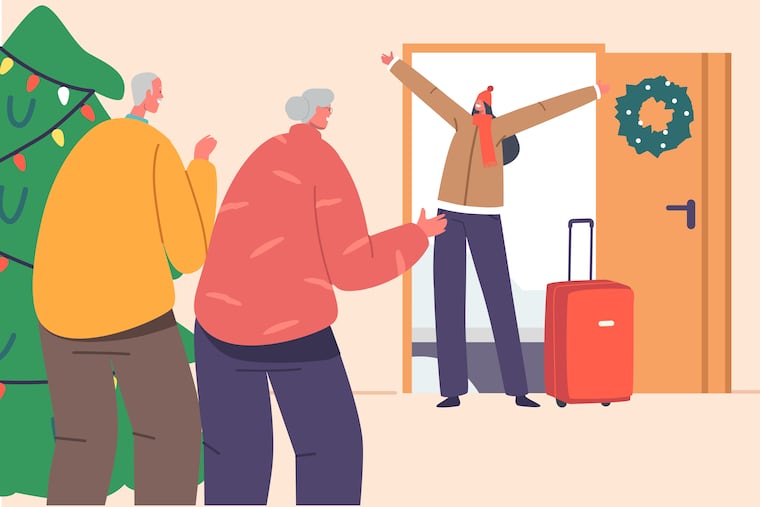Welcome to our home for the holidays. Please don’t stay longer than four nights.
Benjamin Franklin warned about guests stinking like fish after three days. Modern Americans may be more generous by a day.

It’s the season of long holiday visits, and you’ve been making quite an impression on your hosts:
Snoring in the spare room, feasting at the fridge; using more hot water than a nuclear reactor, more towels than a professional football team.
And when, by the way, did you say you were leaving?
As we all know, the overnight stay this time of year can be a lovely custom — tidings of comfort and joy, and all that.
But there are limits.
Benjamin Franklin famously calculated that a house guest is like a fish: Each begins to stink after three days.
As it happens, modern Americans may be slightly more generous than our curmudgeonly founding father, with a plurality of 49% saying in a recent survey that holiday visitors are good for four days before reaching their sell-by dates.
And 79% of people who’ve hosted overnight visitors say their guests seem to instinctively follow this unwritten edict, staying four nights or fewer.
That’s the takeaway from a national survey by OnePoll, a London-headquartered market research company that conducted a survey of 2,000 Americans between Oct. 19 and Oct. 27, commissioned by Serta Simmons Bedding.
The four-day rule could serve as an important guideline toward preserving good will into 2023.
“Whether you’re a guest or host, you have to share your intimate life during a holiday visit,” said Cristina Bicchieri, a University of Pennsylvania philosopher. “Unless the host is living in the Palace of Versailles with 2,300 rooms, this may put a strain on the relationship.”
As it happens, Bicchieri is both a visitor and a host this year, just like one-third of survey respondents. She’s bunking in a house on her mother’s property in Italy but will also be welcoming her daughter and her daughter’s boyfriend visiting from America.
“They’re staying four nights, but I’m staying with my mother for a month, helping take care of her,” Bicchieri said. “I’ll let you know how crazy-making this all turns out to be.”
Adding to the normal anxieties of holiday visits this year is the realization that we’re all a bit pandemic-hobbled.
“Our personal space has been the central ingredient of our lives during lockdown,” said Frank Farley, professor emeritus of psychology at Temple University. “Now, many of us will be sharing that space.”
How well will people who’ve been hibernating interact?
“We may become more quickly judgmental as we come together,” he added.
COVID-19 will be very much a part of the holidays for Andrew Yankowitz, owner and director of Tall Pines day camp in Gloucester County.
Yankowitz, 56, of Cherry Hill, said holiday visitors who’ll be staying for three nights have requested that neither guests nor hosts leave the house during that time.
“This could be difficult,” Yankowitz said.
A veteran host who’s welcomed dozens of visitors, Yankowitz said that, above all, people suddenly thrust into close quarters should strive to maintain good manners.
“Most important: Clean up after yourself,” he advised. “You’re not checking into the Marriott.”
Not a problem for Media pediatrician Joannie Yeh, 40.
“I’m a good guest,” she said. “I’m not a good cook, but I’d like to have a role. So I wash dishes. It’s very satisfying.”
A few more guidelines:
Guests could make things easier by falling in with the rhythms of the household, waking up and going to bed the same times as your host. In fact, around 75% of people surveyed said they do this.
“But if you’re going into the kitchen with bedhead, wearing jammies, make sure it’s OK with the host,” said Pauline Wallin, a family psychologist from Camp Hill, outside Harrisburg. “And guests should take hosts out for a dinner, or buy a pizza, even if you brought a house gift.”
It might not be a bad idea to pack your own bedding, excessive as that might sound. Around 30% of people surveyed do just that, with another 12% saying they would, but worry that would offend their host.
Turns out, roughly 70% of hosts said that wouldn’t insult them.
You’d think no one needs reminding, but guests should avoid snooping in the host home. Still, 30% of Generation-Z survey respondents (born between 1997 and 2012) said they peek in nightstands, compared to 16% of baby boomers. Intuitively sensing this, 7% of hosts said they hide valuables before friends and family sleep over, belying that cliched declaration, “Our house is your house.”
Ultimately, many of us experience tension during holiday visits, noted Ahmet Selim Tekelioglu, 42, who celebrates Ramadan.
“Let’s face it,” said Tekelioglu, executive director of the Council on American-Islamic Relations in Center City, “I enjoy being with family and friends, but then you get to come back to your own home.
“And nowhere compares to that.”